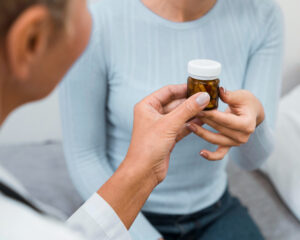Menopause brings major changes to your life, but you can handle them well. Understanding when menopause starts and how long it lasts can help you prepare for this transition. Most women – about 75% – face challenging symptoms during this phase. The right relief strategies can help you move through this time with confidence, whether you’re experiencing the beginning stages of menopause or are further along in your journey.
The symptoms can feel overwhelming. Hot flashes, mood swings, and sleep problems might frustrate you, but many natural relief options can help. You have plenty of tools to manage these changes – from proven herbal remedies to lifestyle changes and supplements. Understanding menopause hormones, particularly estrogen and progesterone, is crucial for navigating this phase effectively.
This piece shows you practical ways to handle your symptoms, boost your health, and build a support network. You’ll learn how to create a custom plan that combines the best relief methods with natural solutions that work for you, including both hormonal and non-hormonal treatments. We’ll explore what menopause is like and why it causes various symptoms, helping you to better understand and manage this transition.
Understanding Your Menopause Journey
When does menopause start? Typically, it begins in your mid-40s, with the average age of menopause being around 51. Most women have their final period around age 52 [1]. When does menopause end? The menopausal transition can last several years, with postmenopause beginning after you’ve gone 12 months without a menstrual cycle. Knowledge about this natural transition and its various phases helps you manage upcoming changes better.
Common physical and emotional changes
This transition affects women differently. 75% of women experience hot flashes [2] that range in frequency and intensity. You might notice these physical and emotional changes, which are common signs of menopause:
- Irregular periods and sleep disruptions
- Vaginal dryness and changes in sexual function
- Mood fluctuations and memory changes
- Changes in body shape and weight distribution
The biggest symptom of menopause varies from woman to woman, but hot flashes are often cited as the most common and disruptive. Understanding why menopause causes hot flashes can help you manage them better. These vasomotor symptoms are believed to be caused by the fluctuation of estrogen levels affecting the body’s temperature regulation.
Menopause phases and stages
The menopausal transition happens in three distinct phases. Perimenopause, the beginning stage of menopause, usually lasts 4 to 8 years [1], and your hormone levels change significantly during this time. Menopause officially starts after 12 months without a period [3]. The postmenopause phase follows with new health considerations for the long term.
Understanding the menopause stages and symptoms can help you navigate this transition more effectively. Here are the 7 stages of menopause:
- Early perimenopause
- Late perimenopause
- Early menopause
- Early post-menopause
- Late post-menopause
- Surgical menopause (if applicable)
- Late post-menopause
How long does menopause last? The entire menopause transition, from perimenopause to postmenopause, can last several years. How long do menopause symptoms last? Symptoms can persist for between 2 and 8 years [7], though some women may experience them for longer.
Creating a positive mindset
Studies show your attitude affects how you handle menopause [4]. Women who stay positive report fewer symptoms and cope better [5]. About 40% of women have mood-related symptoms like PMS [6]. Viewing these changes as natural life events rather than disruptions helps you maintain a balanced view.
Each woman’s path is unique. Your genetics, lifestyle, and cultural background shape this transition [7]. Staying informed with a positive outlook helps you direct this natural life phase better. Understanding what menopause is like for you personally can help you develop strategies to manage your specific symptoms effectively.
Natural Approaches to Symptom Relief
Natural remedies provide relief from menopausal symptoms and work in harmony with your body’s changes. Research shows these methods deliver great benefits if you use them regularly, especially when addressing the hormonal changes associated with menopause, including fluctuations in estrogen and progesterone levels.
Evidence-based herbal remedies
Many herbs show promising results in relieving menopause symptoms. Black cohosh and red clover help reduce menopausal symptoms according to clinical studies [8]. Here are some research-backed options that help manage hot flashes and other symptoms:
- Black cohosh to regulate temperature and mood
- Red clover to reduce hot flashes and night sweats
- Evening primrose oil to relieve overall symptoms
- Valerian to improve sleep and combat insomnia
These herbs may help alleviate vasomotor symptoms and other menopause-related issues by interacting with estrogen receptors or providing phytoestrogens, which are plant-based compounds that mimic estrogen in the body.
Dietary modifications for hormone balance
Your diet plays a vital role in managing hormonal changes, particularly estrogen levels. Studies reveal that women who eat whole foods experience fewer menopausal symptoms [9]. Foods rich in phytoestrogens can help balance your hormone levels naturally. Research shows that Asian women’s traditional soy-based diet leads to fewer hot flashes [10].
Mind-body practices for wellness
Mind-body exercises have become powerful tools in managing menopausal symptoms. Recent studies show that yoga, tai chi, and mindfulness meditation improve bone mineral density and sleep quality while reducing anxiety [11]. Mindfulness-based practices stand out as they help reduce how often hot flashes occur and how intense they feel [12].
These natural approaches deliver the best results when combined into a comprehensive management strategy. Studies reveal that balancing non-pharmacological and pharmacological therapy leads to optimal results [13]. Make sure to ask your healthcare provider before starting any new supplements, since natural remedies can interact with medications [14].
Lifestyle Changes for Better Management
Your menopause symptoms can improve a lot with the right lifestyle changes. Research shows that women who stick to lifestyle modifications experience fewer symptoms and feel better during this transition. These changes can help address various aspects of the menopause transition, including genitourinary changes and bone loss.
Exercise and movement strategies
Physical activity helps manage menopausal symptoms effectively. Women who exercise regularly experience better sleep quality and fewer hot flashes [15]. You can get the best results by adding these proven activities:
- Strength training (2-3 sessions weekly) for muscle mass and bone health [16]
- Cardiovascular exercise (150 minutes weekly) for heart health and to reduce the risk of cardiovascular disease [17]
- Weight-bearing activities like walking or dancing for bone density and to combat osteoporosis [15]
- Low-impact exercises if you have joint concerns [18]
Regular exercise can also help manage weight gain often associated with menopause and support overall health as your body adjusts to changes in estrogen levels.
Sleep optimization techniques
Good sleep plays a vital role during menopause, especially in combating insomnia. Your rest quality can improve by following a consistent sleep schedule [19]. A cool, dark, and quiet bedroom creates better sleeping conditions. Research shows that sleep quality improves when you avoid screens 60 minutes before bed [20] and stick to regular sleep-wake times.
Stress reduction practices
High stress levels can make menopausal symptoms worse [21]. Cognitive behavioral therapy (CBT) has proven highly effective at reducing stress and helping with sleep [21]. The 4-count breathing technique can help – just inhale through your nose and exhale through your mouth [20]. Your hot flashes may decrease and emotional well-being can improve with regular meditation [22].
Small changes work better than trying to change everything at once. Women who gradually add multiple lifestyle modifications see better improvements in their menopausal symptoms [23]. Start small and build new habits over time to manage the various symptoms of menopause at 50 and beyond.
Building Your Support System
A strong support network will improve your menopause experience by a lot. Research shows that women with social support networks report more positive experiences during menopause and are less likely to experience depression [24].
Communication with family and friends
Talking about your menopause experience might feel tough, but studies show women who talk openly with loved ones feel better emotionally. These proven communication strategies can help:
- Share educational resources to help them understand your experience and what happens during menopause
- Express specific needs clearly and directly
- Schedule regular check-ins with close family members
- Create opportunities for honest discussions about your experiences, including mood changes and brain fog
Finding healthcare providers
The right healthcare provider plays a vital role in managing menopause effectively and discussing menopause treatment options, including hormone therapy when appropriate. 80% of OB-GYN residents report feeling uncomfortable discussing menopause [25], so finding specialists with proper training becomes important. The North American Menopause Society (NAMS) has a directory of certified menopause practitioners who showed expertise through specialized training and examination [26].
Connecting with other women
Women who join social groups have less severe menopausal symptoms, according to research [27]. Online communities and local support groups are a great way to get advice and share experiences about the signs of starting menopause and how to cope with them. Studies show that adults who maintain strong social connections enjoy better health outcomes and improved quality of life [24].
Menopause-focused educational programs help reduce symptoms and improve overall quality of life [27]. Local support groups, online forums, or hosted retreats let you connect with others who understand your experience and provide emotional support and practical advice for managing menopause naturally.
Healthcare professionals should know how these support systems affect both your well-being and your family’s life [24]. Choose support options that line up with your personal comfort level and lifestyle needs.
Conclusion
Menopause is one of life’s most important transitions. The right strategies and knowledge will help you guide through this phase successfully. A combination of research-backed natural remedies, mindful lifestyle changes, and strong support systems creates an effective relief plan that fits your needs.
Managing menopause symptoms requires an integrated approach, which may include both hormone therapy and non-hormonal treatments. These symptoms might feel overwhelming initially, but millions of women have experienced this transformation before you. Women who use multiple management strategies report better outcomes and improved quality of life. These strategies range from herbal remedies to regular exercise and stress reduction techniques.
Each woman’s experience is different, which makes personalized symptom management crucial. A positive mindset and connections with supportive healthcare providers and fellow women will help you welcome this natural transition confidently and gracefully. This new chapter brings opportunities to grow, find yourself, and improve your well-being when you have the right tools and attitude.
Whether you’re dealing with premature menopause or experiencing the typical menopause transition, remember that this phase is a natural part of life. By understanding the changes in your ovaries, the fluctuations in estrogen and progesterone, and the various stages of menopause, you can better navigate this journey. From managing vasomotor symptoms to addressing urinary issues and bone loss, a comprehensive approach to menopause care can help you thrive during this transformative time.
References
[1] – https://www.mayoclinic.org/diseases-conditions/menopause/symptoms-causes/syc-20353397 [2] – https://www.hopkinsmedicine.org/health/conditions-and-diseases/introduction-to-menopause [3] – https://www.webmd.com/menopause/understanding-menopause-symptoms [4] – https://www.psychologytoday.com/us/blog/women-autism-spectrum-disorder/202203/5-ways-changing-your-thoughts-can-help-during-menopause [5] – https://www.ideafit.com/mindset-and-menopause/ [6] – https://www.acog.org/womens-health/experts-and-stories/the-latest/mood-changes-during-perimenopause-are-real-heres-what-to-know [7] – https://www.nia.nih.gov/health/menopause/what-menopause [8] – https://pmc.ncbi.nlm.nih.gov/articles/PMC8708702/ [9] – https://www.healthline.com/nutrition/menopause-diet [10] – https://www.mayoclinic.org/diseases-conditions/hot-flashes/diagnosis-treatment/drc-20352795 [11] – https://journals.lww.com/menopausejournal/fulltext/2024/05000/effects_of_mind_body_exercise_on_perimenopausal.13.aspx [12] – https://newsnetwork.mayoclinic.org/discussion/mindfulness-may-ease-menopausal-symptoms/ [13] – https://pmc.ncbi.nlm.nih.gov/articles/PMC3555027/ [14] – https://www.nhs.uk/medicines/hormone-replacement-therapy-hrt/alternatives-to-hormone-replacement-therapy-hrt/herbal-remedies-and-complementary-medicines-for-menopause-symptoms/ [15] – https://www.nhs.uk/conditions/menopause/things-you-can-do/ [16] – https://www.nytimes.com/2024/08/21/well/move/exercise-tips-menopause.html [17] – https://newsnetwork.mayoclinic.org/discussion/womens-wellness-fitness-tips-for-menopause/ [18] – https://mydoctor.kaiserpermanente.org/mas/news/how-to-exercise-during-menopause-2134018 [19] – https://www.nia.nih.gov/health/menopause/sleep-problems-and-menopause-what-can-i-do [20] – https://www.visanahealth.com/post/3-strategies-for-reducing-stress-during-menopause [21] – https://mydoctor.kaiserpermanente.org/mas/news/stress-and-menopause-how-to-cope-2241585 [22] – https://www.webmd.com/menopause/learning-relax-during-menopause [23] – https://nyulangone.org/news/manage-menopause-these-lifestyle-updates [24] – https://pmc.ncbi.nlm.nih.gov/articles/PMC7696753/ [25] – https://www.letstalkmenopause.org/healthcare-providers [26] – https://menopause.org/patient-education/choosing-a-healthcare-practitioner [27] – https://www.feistymenopause.com/blog/finding-your-people-during-menopause






